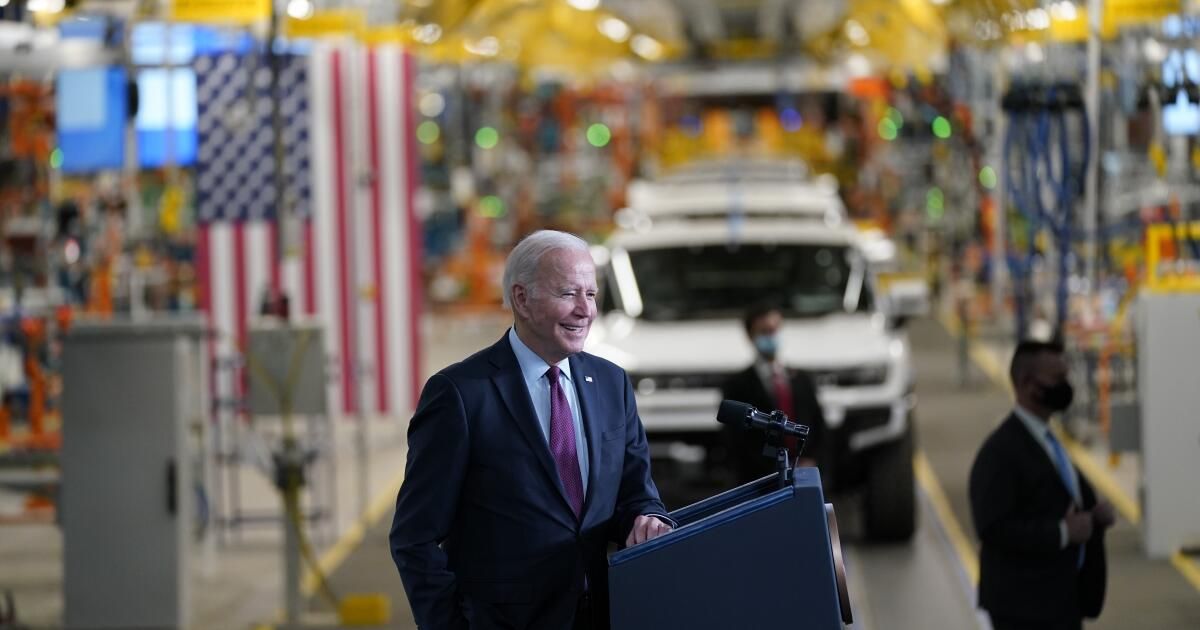It is deeply disturbing that the Biden administration is planning to relax one of the biggest climate actions it has proposed – strict auto emissions standards designed to rapidly increase sales of electric vehicles – in an apparent election-year concession to automakers and unions. Transportation is the nation's largest source of greenhouse gas emissions, and these standards are among the most powerful tools the United States has to reduce pollution quickly enough to meet its climate change goals.
President Biden is wrong if he believes that weakening environmental protections will help him get re-elected. Promoting strong standards that position the country toward a healthier, more globally competitive future should be seen as an asset to his campaign, not a liability.
The rules were proposed last year by the Environmental Protection Agency to increase sales of new zero-emission cars and light trucks from about 7% of vehicles sold today to more than 67% by 2032. But multiple media reported last week that the Biden administration could allow automakers to move more gradually toward that goal until after 2030, when it issues final rules next month.
This would be an undeserved gift to automakers that have continually sought delays in environmental standards to continue selling as many highly profitable, gas-guzzling SUVs as possible, even as they publicize their own ambitious plans to transition to zero-emission vehicles. It may also be a concession to the powerful United Auto Workers union, which cited concerns about the transition to electric vehicles as one of the reasons for withholding its endorsement of Biden. until the end of last month. Organized labor is important to Biden's re-election strategy in key swing states, including Michigan, where auto workers worry that the shift to electric vehicles will shrink the workforce or shift jobs to lower-paying, non-union plants.
But the administration should understand that supporting good-paying jobs in the auto industry and upholding high environmental standards are not mutually exclusive. Slowing the adoption of electric vehicles in the country is going in the wrong direction as the effects of climate change are accelerating. Earth had its hottest year on record in 2023 and the weather has become more unpredictable and deadly.
The administration says it is “confident” the United States will reach its goal of 50% zero-emission new car sales by 2030, and appears to be arguing that the pace of the transition to electric vehicles is not as important as the goal. final. But speed matters a lot when it comes to reducing air pollution and fighting climate change, especially after decades of world leaders doing nothing.
Every year we delay phasing out fossil fuel-powered vehicles is another year we fail the most vulnerable populations, including low-income people and communities of color hardest hit by the effects of air pollution. , and to future generations who will have to deal with the consequences of global warming. It's also another year in which the United States risks falling even further behind competing economies, like China, that are embracing electric cars and may dominate global transportation if we fail to keep pace.
These decisions are not harmless. More than 100 million Americans live with air so polluted it can shorten their lives. Delayed pollution reductions mean children with developing lungs and people with asthma will have to wait years longer to air that does not compromise your healthand all of us who will be saddled with a more dangerous climate due to years of excess emissions.
This is not the first time the Biden administration has backed down on an environmental obligation for what appear to be political reasons. Last summer, for example, EPA Administrator Michael S. Regan delayed action to strengthen the nation's health standards for ozone (the lung-burning smog gas) until after the 2024 presidential election. .
Instead of slowing down the EV revolution and allowing powerful industries and interests to gain valuable delay, Biden should stand firm and focus on removing the barriers that are holding back EV adoption. Fixing the horrible state of the country's vehicle charging network or simplifying the confusing system of tax credits and refunds would make it easier and more affordable for Americans to give up their gas-guzzling cars.
Candidates make all kinds of deals and campaign promises to gain the support of powerful interests. But if Biden wants to win re-election in November, he must achieve results that do not come at the expense of our health and our climate.












